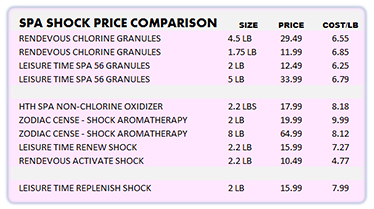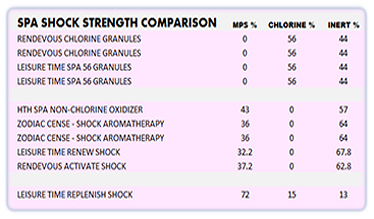Chlorine or Non-Chlorine Shock for Hot Tubs?
This post takes a look at the differences between two types of oxidizers used for spa shock treatments - Sodium DiChlor (chlorine granules) or MPS - Monopersulfate (chlorine-free).
WHY SHOCK SPAS & HOT TUBS?
Oxidizers are added to pools and spas to destroy pathogens like bacteria and viruses, and also organic contaminants that lead to algae growth.
The second main reason is to destroy molecular combinations between your main sanitizer (chlorine or bromine), and other organic matter, which create foul-smelling amines in the water.
WHEN TO SHOCK A SPA?
The best time to shock a spa is after you have used the spa, or every 7-10 days. Don't shock just before using the spa which will reduce it's effectiveness, and could cause skin irritation. Wait at least an hour after shocking (with MPS), while circulating the water with the spa cover open, before getting in the tub.
HOW TO SHOCK A HOT TUB?
Follow the label instructions, for specific dosages. Check your pH first, and adjust to within 7.2 - 7.6. This will allow the oxidizer to work harder, with a pH in the lower half of the scale. Just shake the required amount over the water, being careful of winds, which could blow the powder in your face. Don't rinse off the cap or scoop in the water, keep it dry and clean at all times for safety. Keep the cover open to allow for gassing off, an important part of the process.
WHAT TYPE OF SPA SHOCK IS BEST?
Finally, we are at the meat of this post - which is better for spas and hot tubs, MPS or chlorine shock? Let's create some distinctions between the two types of spa shock, by looking at benefits of each, not shared by the other.
PRICE COMPARISON

How do Chlorine Granules compare to MPS in terms of price? Is there a large difference between the two? Our chart shows 4 chlorine shocks, 5 MPS shocks, and one blend, Replenish, which contains MPS, with some chlorine added.
Chlorine granules come out a bit cheaper by the pound than MPS spa shock, which has a much wider price range, all higher per pound than chlorine, with the notable exception of Activate shock.
STRENGTH COMPARISON

The reason that DiChlor shock is used in spas, is that DiChlor is more stable at higher temperatures and has a near neutral pH level. Spa shocks are particularly fine, more of a powder than a granular, so that they dissolve quickly.
All 4 of the chlorine hot tub shocks are 56% Available Chlorine. Among the 5 non-chlorine spa shocks, all are blends of MPS in different formulations, with different percentage of MPS.
If one was to generalize the relative strengths of MPS and DiChlor, it could be said that both Dichlor and MPS have equivalent ability as an algaecide, bactericide and virucide. Dichlor shock may have an edge for spas that are heavily used, or in need of high levels of oxidation.
FEATURES AND BENEFITS
CHLORINATED GRANULES:
Although there are many types of pool shocks available, using Calcium or Lithium or Sodium Hypochlorite, chlorine hot tub shocks are primarily made with Sodium DiChloro-S-Triazinetrione, or DiChlor for short.
- Neutral pH, Quick dissolving
- Sanitizes and oxidizes pathogens and organic contaminants
- Lower price point
MPS SHOCK:
There are a few formulations of MPS, but most of the monopersulfate sold for spas and hot tubs is a blend of MPS, primarily purchased from DuPont, and packaged for resale under many brand names.
- Low pH, Quick dissolving
- An excellent oxidizer and a fair sanitizer
- Does not contribute calcium or cyanuric acid to your spa water
- Can use the spa almost immediately, unlike with chlorine
- No odor, gentle on spa covers
THE BOTTOM LINE: If you are not using bromine tablets to sanitize, but instead using minerals and ozone, DiChlor may be a better shock to use, but if you use Bromine tablets or Angel Tabs to sanitize, use the MPS shock to oxidize. I've always used bromine tablets and shock the spa with MPS after we use it. However, I also keep some DiChlor on hand, and give the spa a super shock about every month.